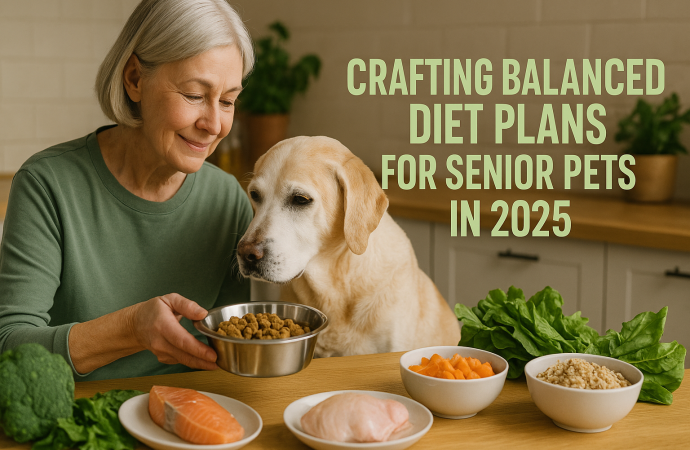Introduction As pets grow older, they need special care to stay healthy and active. Just like humans, senior pets need the right kind of food to stay strong and happy. The balanced diet of a senior pet is different from a young pet’s diet because they need extra nutrients for their joints, digestion, and overall
Introduction
As pets grow older, they need special care to stay healthy and active. Just like humans, senior pets need the right kind of food to stay strong and happy. The balanced diet of a senior pet is different from a young pet’s diet because they need extra nutrients for their joints, digestion, and overall well-being.
In 2025, senior pet diets are more important than ever. With the right nutrition, pets can live longer and have a better quality of life. This article will help you understand how to create the best diet plan for your senior pets. From essential nutrients to the right foods, we’ll cover everything you need to know.
What Is a Balanced Diet for Senior Pets?

Image by: Yandex.com
A balanced diet for senior pets includes a mix of the right types of food to support their health as they age. As pets grow older, their metabolism slows down, and they may need fewer calories but more specific nutrients. Their joints, bones, and digestion may need extra support.
A balanced diet for senior pets should contain:
- High-quality protein: Helps maintain muscles.
- Healthy fats: Support energy and joint health.
- Fiber: Improves digestion and keeps the system running smoothly.
- Vitamins and minerals: Strengthens the immune system and supports overall health.
By giving your senior pet the right food, you can help them stay active and healthy for longer.
Key Nutrients for Senior Pet Health

Image by: Yandex.com
1. Protein for Muscle Maintenance
As pets age, they naturally lose muscle mass. Protein is important because it helps maintain strong muscles. Senior pets need enough protein to keep their muscles from weakening. You should choose high-quality animal proteins, such as chicken, turkey, or fish, as these provide all the amino acids your pet needs for muscle repair.
2. Healthy Fats for Energy and Joints
Older pets may not be as active as they used to be, so they may not need as many calories. However, healthy fats are still important for providing energy and keeping their joints healthy. Omega-3 fatty acids found in fish oil or flaxseed are especially good for reducing inflammation and supporting joint health.
These fats also help keep your pet’s coat shiny and their skin healthy.
3. Fiber for Digestive Health
As pets age, their digestive systems can slow down. Fiber helps promote healthy digestion by supporting bowel movement and preventing constipation. It also helps keep your pet’s weight in check by promoting feelings of fullness without adding unnecessary calories.
Good sources of fiber include sweet potatoes, pumpkin, carrots, and brown rice. These foods are easy to digest and gentle on older pets’ systems.
4. Vitamins and Minerals for Immune Support
Vitamins like A, C, and E are essential for your pet’s immune system. They help fight off infections and prevent cell damage. Calcium and phosphorus are also important for maintaining healthy bones, which is especially important for senior pets who may be dealing with arthritis or other joint issues.
How to Create a Balanced Diet Plan for Your Senior Pet

Image by: Yandex.com
Creating a balanced diet for your senior pet is easy if you follow some simple guidelines. Here’s how to get started:
1. Consult Your Veterinarian
Before changing your pet’s diet, it’s a good idea to talk to your vet. They can help you understand your pet’s specific needs and make sure they are getting the right nutrients. Your vet may suggest a special diet if your pet has health conditions like diabetes, kidney disease, or arthritis.
2. Choose High-Quality, Age-Appropriate Food
Look for senior pet foods that are designed to meet the nutritional needs of older pets. These foods often contain the right balance of protein, fat, and fiber to support your pet’s health. Make sure to choose foods that list real meat as the first ingredient and avoid those with too many fillers like corn or soy.
3. Watch the Portion Size
Senior pets are less active and may not need as many calories as they did when they were younger. Follow the portion size recommendations on your pet food label or ask your vet to recommend the right amount. Overfeeding can lead to weight gain, which can strain your pet’s joints and increase the risk of other health problems.
4. Incorporate Supplements if Needed
If your pet needs extra nutrients, consider adding supplements to their diet. Common supplements for senior pets include glucosamine for joint health, fish oil for omega-3s, and probiotics for digestive health. Make sure to consult your vet before adding supplements to ensure they are safe and beneficial for your pet.
5. Mix Wet and Dry Food
Some senior pets may have trouble chewing dry food due to dental issues. In this case, mixing wet and dry food can make meals easier to eat. Wet food also provides extra hydration, which is especially important for pets with kidney or urinary problems.
Future of Senior Pet Nutrition

Image by: Yandex.com
Looking ahead, senior pet nutrition will grow more personal and convenient. AI-driven apps could track a pet’s weight and suggest diet tweaks in real time. Smart feeders may dispense exact portions at set times. Meal-prep services will expand options for allergies and digestive issues. Research will lead to new ingredients like algae-based omega-3s and plant proteins for senior health. As tech, expert support, and meal services improve, feeding older pets balanced, age-friendly diets will become easier than ever.
Comparative Table: Nutrient Breakdown for Senior Pet Diets
| Nutrient | Purpose | Sources |
|---|---|---|
| Protein | Helps maintain muscle mass | Chicken, turkey, fish, beef, lamb |
| Healthy Fats | Supports joint health, skin, and coat | Fish oil, flaxseed, coconut oil |
| Fiber | Improves digestion | Sweet potatoes, pumpkin, carrots, rice |
| Vitamins & Minerals | Boosts immune system and overall health | Carrots, spinach, broccoli, blueberries |
| Glucosamine | Supports joint health | Fish, shellfish, supplements |
| Calcium & Phosphorus | Maintains bone strength | Dairy (in moderation), bone-in meats, fish |
Conclusion
Creating a balanced diet for senior pets is essential to keeping them healthy and comfortable as they age. By providing the right mix of protein, healthy fats, fiber, and vitamins, fruits vegetables you can support their digestion, joints, and overall well-being. Be sure to consult your vet to create a customized diet plan for your pet, and avoid common mistakes like overfeeding or feeding inappropriate foods.
In 2025, with the right diet and care, your senior pet can continue to enjoy a happy, healthy life for years to come.
















